Intro
Respiratory Syncytial Virus (RSV) is a common and highly contagious virus that affects people of all ages, but it's most severe in young children and older adults. RSV is the leading cause of lower respiratory tract infections in infants and young children worldwide. In the United States alone, RSV is responsible for approximately 57,527 hospitalizations and 2.1 million outpatient visits among children under the age of 5 each year. Understanding the symptoms of RSV in babies and adults is crucial for early detection, proper treatment, and prevention of complications.
RSV infections can occur at any time of the year, but they tend to peak during the winter months. The virus spreads through respiratory droplets, contact with contaminated surfaces, and close contact with an infected person. In babies, RSV can cause mild, moderate, or severe symptoms, ranging from a runny nose and cough to pneumonia and bronchiolitis. In adults, RSV typically causes mild symptoms, but it can be severe in older adults, especially those with underlying health conditions. Recognizing the symptoms of RSV is essential for seeking medical attention promptly and preventing further complications.
The symptoms of RSV can vary depending on the age and health status of the individual. In babies, the symptoms can be more severe and may include apnea (pauses in breathing), wheezing, and difficulty feeding. In adults, the symptoms are often milder and may resemble those of a common cold. However, in older adults or those with weakened immune systems, RSV can cause more severe symptoms, such as pneumonia, bronchitis, and exacerbation of underlying health conditions. Understanding the symptoms of RSV in babies and adults is vital for providing proper care, managing symptoms, and preventing the spread of the virus.
RSV Symptoms in Babies
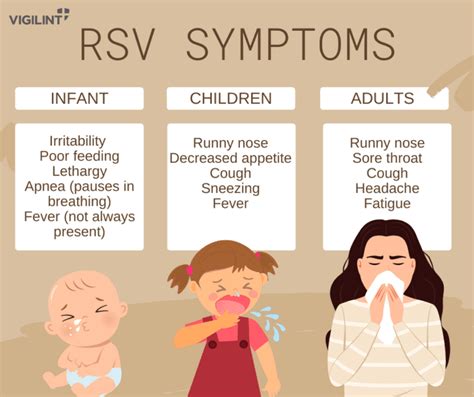
The symptoms of RSV in babies can be similar to those of other respiratory viruses, making diagnosis challenging. However, a healthcare provider can perform a physical examination, take a medical history, and conduct diagnostic tests, such as a rapid antigen test or a polymerase chain reaction (PCR) test, to confirm the diagnosis. If a baby is diagnosed with RSV, the healthcare provider may recommend treatment to manage symptoms, such as acetaminophen for fever, and provide guidance on how to prevent the spread of the virus.
Severe RSV Symptoms in Babies
Severe RSV symptoms in babies can be life-threatening and require immediate medical attention. These symptoms may include apnea, severe wheezing, and difficulty feeding. If a baby experiences any of these symptoms, it's essential to seek medical help right away. A healthcare provider can provide oxygen therapy, mechanical ventilation, and other supportive care to help manage the symptoms and prevent further complications.RSV Symptoms in Adults
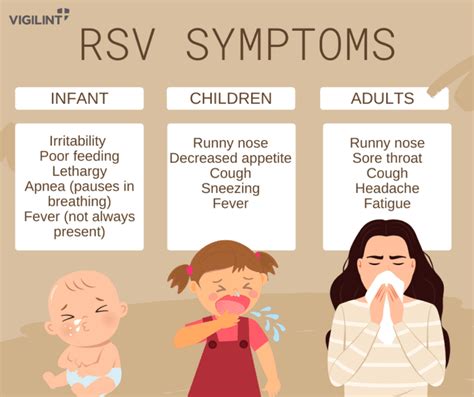
The symptoms of RSV in adults can be similar to those of other respiratory viruses, making diagnosis challenging. However, a healthcare provider can perform a physical examination, take a medical history, and conduct diagnostic tests, such as a rapid antigen test or a PCR test, to confirm the diagnosis. If an adult is diagnosed with RSV, the healthcare provider may recommend treatment to manage symptoms, such as acetaminophen for fever, and provide guidance on how to prevent the spread of the virus.
Mild RSV Symptoms in Adults
Mild RSV symptoms in adults can include runny nose, coughing, sneezing, and fever. These symptoms are often self-limiting and can be managed with over-the-counter medications and home remedies. However, it's essential to seek medical attention if symptoms worsen or if an adult has underlying health conditions that may increase the risk of complications.Diagnosis and Treatment of RSV
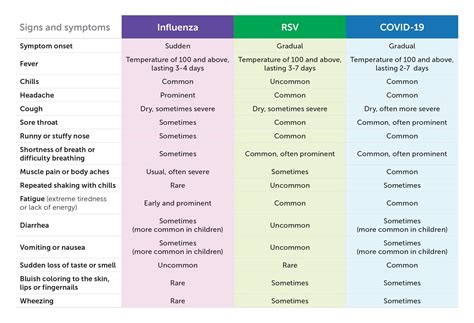
Preventing the spread of RSV is crucial, especially in high-risk groups, such as young children and older adults. Practicing good hygiene, such as washing hands frequently, avoiding close contact with infected individuals, and cleaning contaminated surfaces, can help prevent the spread of the virus. Additionally, avoiding sharing utensils, toys, and other personal items can help reduce the risk of transmission.
Prevention of RSV
Preventing RSV requires a combination of good hygiene practices, avoiding close contact with infected individuals, and taking precautions to reduce the risk of transmission. This can include washing hands frequently, avoiding sharing utensils and personal items, and cleaning contaminated surfaces. Additionally, getting vaccinated against RSV, if available, can help prevent the spread of the virus.Complications of RSV

RSV and Underlying Health Conditions
RSV can exacerbate underlying health conditions, such as asthma, chronic obstructive pulmonary disease (COPD), and heart disease. If an individual has an underlying health condition, it's essential to seek medical attention promptly if symptoms of RSV occur. A healthcare provider can provide guidance on how to manage symptoms and prevent further complications.RSV and Pregnancy
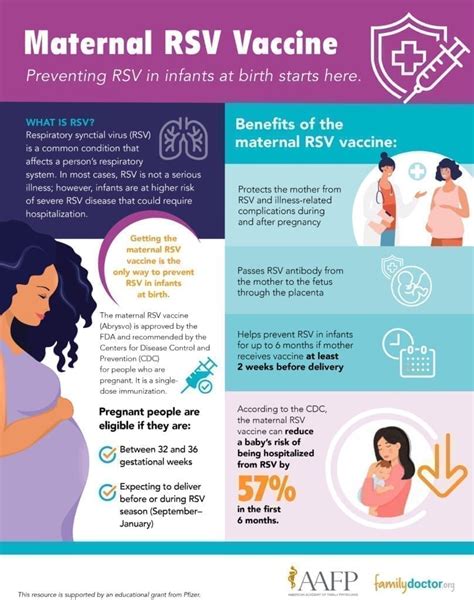
RSV and Newborns
RSV can affect newborns, especially those born prematurely or with underlying health conditions. If a newborn contracts RSV, it's essential to seek medical attention promptly to prevent further complications. A healthcare provider can provide guidance on how to manage symptoms and prevent the spread of the virus.RSV Vaccine
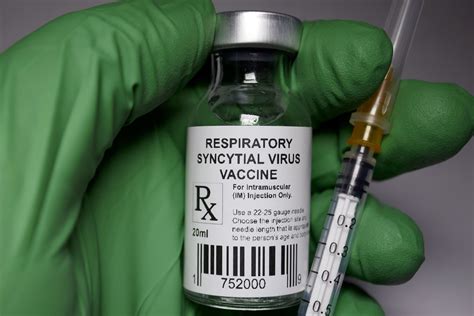
RSV Treatment Options
Treatment options for RSV typically focus on managing symptoms, such as acetaminophen for fever, and providing supportive care, such as oxygen therapy and mechanical ventilation, for severe cases. In some cases, antiviral medications, such as ribavirin, may be prescribed to treat RSV. A healthcare provider can provide guidance on the best course of treatment for RSV.Conclusion and Next Steps

If you or a loved one is experiencing symptoms of RSV, it's essential to seek medical attention promptly. A healthcare provider can provide guidance on how to manage symptoms, prevent further complications, and reduce the risk of transmission. By working together, we can help prevent the spread of RSV and protect those who are most vulnerable to the virus.
We invite you to share your thoughts and experiences with RSV in the comments below. Have you or a loved one contracted RSV? What steps did you take to manage symptoms and prevent further complications? Your insights can help others who are going through similar experiences.
What are the symptoms of RSV in babies?
+The symptoms of RSV in babies can include runny nose, coughing, sneezing, fever, and loss of appetite. In severe cases, babies may experience apnea, wheezing, and difficulty feeding.
How is RSV diagnosed?
+RSV is diagnosed through a physical examination, medical history, and diagnostic tests, such as a rapid antigen test or a PCR test.
What are the complications of RSV?
+RSV can cause several complications, especially in high-risk groups, such as young children and older adults. These complications can include pneumonia, bronchiolitis, and exacerbation of underlying health conditions.
Is there a vaccine available for RSV?
+There is no vaccine available for RSV, but researchers are working to develop one. In the meantime, practicing good hygiene, avoiding close contact with infected individuals, and taking precautions to reduce the risk of transmission can help prevent the spread of the virus.
How can I prevent the spread of RSV?
+Practicing good hygiene, avoiding close contact with infected individuals, and taking precautions to reduce the risk of transmission can help prevent the spread of RSV. This can include washing hands frequently, avoiding sharing utensils and personal items, and cleaning contaminated surfaces.
